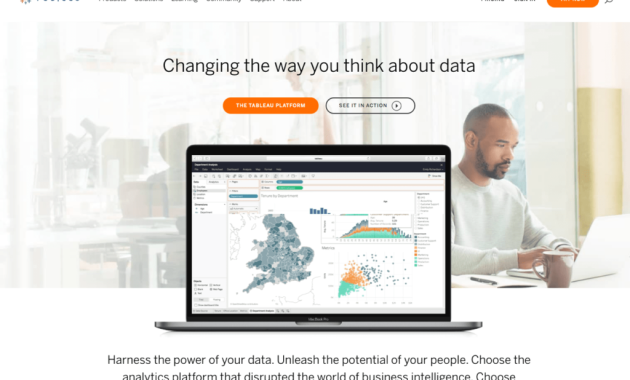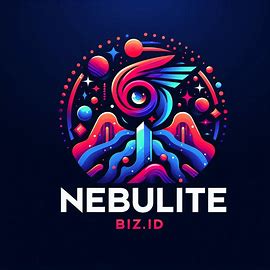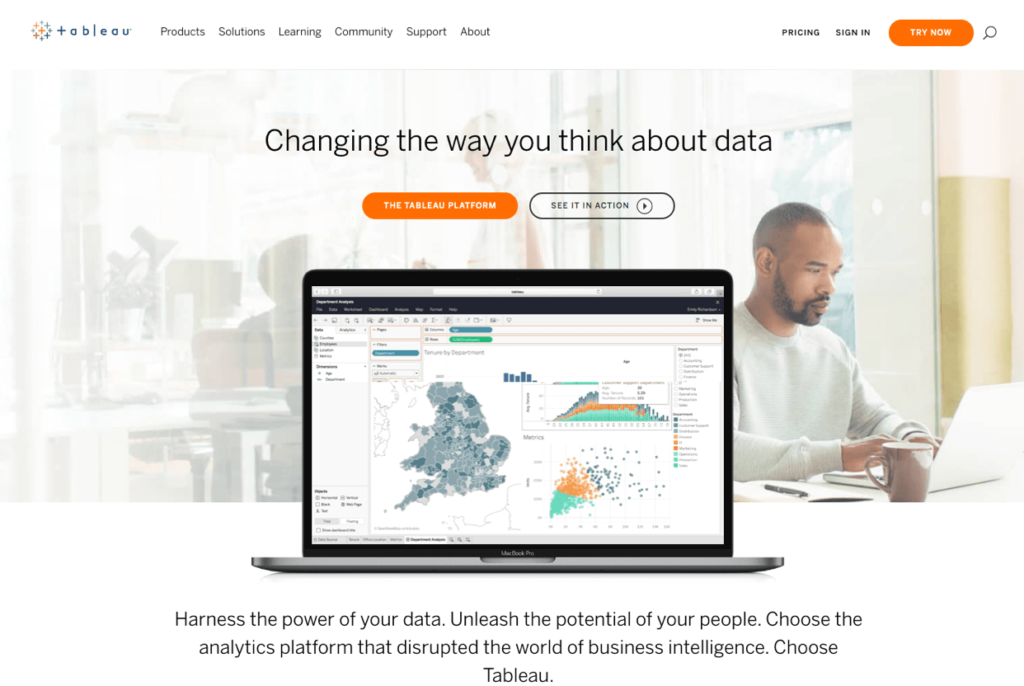
Top 21 Business Intelligence Tools You Can’t Ignore: A Comprehensive Guide
In today’s data-driven world, businesses of all sizes are drowning in information. The challenge isn’t just collecting data; it’s understanding it. This is where business intelligence (BI) tools come in. They transform raw data into actionable insights, empowering organizations to make better decisions, improve efficiency, and gain a competitive edge. This article explores the top 21 business intelligence tools that are essential for any business looking to thrive in the modern landscape. These tools offer diverse functionalities, from data visualization and reporting to advanced analytics and data warehousing. They cater to different needs, budgets, and technical expertise levels. Choosing the right BI tools is crucial for success. We’ll delve into each tool, highlighting its key features, strengths, and ideal use cases. This guide will help you navigate the complex world of business intelligence and select the tools that best fit your organization’s needs. Understanding and leveraging these business intelligence tools is no longer optional; it’s a necessity. This overview of the top 21 business intelligence tools aims to equip you with the knowledge to make informed decisions and drive your business forward.
Understanding the Power of Business Intelligence
Before diving into specific tools, it’s vital to grasp the core principles of business intelligence. BI is the process of collecting, analyzing, and presenting business data to provide insights that support strategic and tactical decision-making. It involves extracting data from various sources, such as databases, spreadsheets, and cloud applications. Then, it transforms this data into meaningful visualizations, reports, and dashboards. Effective BI empowers businesses to:
- Identify trends and patterns.
- Measure performance against key metrics.
- Uncover hidden opportunities.
- Optimize processes.
- Improve customer experiences.
The benefits of implementing business intelligence are numerous. Companies that embrace BI often experience significant improvements in revenue, profitability, and operational efficiency. Furthermore, BI tools enable organizations to make data-driven decisions, reducing reliance on gut feelings and subjective opinions. This leads to more informed choices and better outcomes.
Key Features to Look for in Business Intelligence Tools
When evaluating business intelligence tools, consider the following features:
- Data Integration: The ability to connect to a wide range of data sources.
- Data Visualization: Powerful tools for creating charts, graphs, and dashboards.
- Reporting: Customizable reports and automated report generation.
- Data Analysis: Capabilities for performing statistical analysis and data mining.
- User-Friendliness: An intuitive interface and ease of use.
- Collaboration: Features that allow users to share insights and collaborate on projects.
- Scalability: The ability to handle large volumes of data as your business grows.
- Mobile Access: The option to view reports and dashboards on mobile devices.
The Top 21 Business Intelligence Tools
This section provides a detailed overview of the top 21 business intelligence tools. Each tool is selected for its unique capabilities and its impact on the market.
Tableau
Tableau is a leading data visualization and business intelligence platform. It is known for its user-friendly interface and ability to create stunning visualizations. Tableau supports a wide range of data sources and offers powerful analytical capabilities. It is a great choice for businesses that need to create compelling reports and dashboards.
Microsoft Power BI
Microsoft Power BI is a comprehensive business intelligence platform that integrates seamlessly with other Microsoft products. It offers a robust set of features, including data modeling, data visualization, and collaboration tools. Power BI is an excellent option for businesses already invested in the Microsoft ecosystem.
Qlik Sense
Qlik Sense is a self-service business intelligence platform that offers a unique associative data model. This allows users to explore data in new and innovative ways. Qlik Sense is known for its ease of use and powerful analytical capabilities.
Sisense
Sisense is a business intelligence platform designed for complex data analysis. It excels at handling large datasets and offers advanced analytical capabilities. Sisense is a good choice for businesses that need to analyze massive amounts of data.
Looker
Looker, now part of Google Cloud, is a data analytics platform that focuses on data modeling and exploration. It allows users to define a single source of truth for their data and build sophisticated dashboards. Looker is a great option for businesses that want to create a unified data view.
ThoughtSpot
ThoughtSpot is a search-driven business intelligence platform. It allows users to ask questions about their data using natural language. ThoughtSpot is ideal for users who want to quickly find answers to their questions.
Domo
Domo is a cloud-based business intelligence platform that offers a comprehensive suite of features. It includes data integration, data visualization, and collaboration tools. Domo is suitable for businesses of all sizes.
Zoho Analytics
Zoho Analytics is a business intelligence and analytics platform. It is known for its ease of use and affordability. Zoho Analytics is a good choice for small and medium-sized businesses (SMBs).
Board
Board is a business intelligence and performance management platform. It combines BI with budgeting, forecasting, and planning capabilities. Board is ideal for businesses that need a comprehensive performance management solution.
MicroStrategy
MicroStrategy is an enterprise-grade business intelligence platform. It offers advanced analytical capabilities and supports complex data modeling. MicroStrategy is suitable for large organizations with complex data needs.
SAP Analytics Cloud
SAP Analytics Cloud is a cloud-based business intelligence and planning solution. It integrates with other SAP products and offers a range of analytical capabilities. SAP Analytics Cloud is a good choice for businesses using SAP systems.
Oracle Analytics Cloud
Oracle Analytics Cloud is a comprehensive business intelligence platform. It offers a wide range of features, including data integration, data visualization, and advanced analytics. Oracle Analytics Cloud is suitable for businesses of all sizes.
Yellowfin
Yellowfin is a business intelligence platform that focuses on data storytelling and collaboration. It offers a user-friendly interface and powerful analytical capabilities. Yellowfin is a great choice for businesses that want to communicate insights effectively.
Birst
Birst is a cloud-based business intelligence platform that focuses on agile BI. It offers a flexible architecture and supports a wide range of data sources. Birst is a good choice for businesses that need a flexible and scalable solution.
InetSoft Style Intelligence
InetSoft Style Intelligence is a business intelligence platform known for its interactive dashboards and data visualization capabilities. It offers a user-friendly interface and supports a variety of data sources. This is a great option for businesses that want to create visually appealing dashboards.
SAS Visual Analytics
SAS Visual Analytics is a powerful business intelligence platform. It offers advanced analytical capabilities and supports large datasets. SAS Visual Analytics is ideal for businesses with complex analytical needs.
Alteryx
Alteryx is a data analytics platform that focuses on data preparation, blending, and advanced analytics. It is a powerful tool for data scientists and analysts. Alteryx is an excellent choice for businesses that need to prepare and analyze complex data.
Klipfolio
Klipfolio is a cloud-based business intelligence dashboard platform. It is known for its ease of use and ability to create custom dashboards. Klipfolio is a good choice for businesses that need to monitor key metrics in real-time.
Grow.com
Grow.com is a business intelligence platform designed for SMBs. It offers a user-friendly interface and a range of pre-built integrations. Grow.com is a great option for businesses that want a simple and affordable BI solution.
GoodData
GoodData is a cloud-based business intelligence platform that focuses on embedded analytics. It allows businesses to embed analytics into their applications. GoodData is ideal for software vendors and businesses that want to integrate analytics into their products.
Datawrapper
Datawrapper is a tool for creating charts and maps. It is known for its ease of use and ability to create visually appealing visualizations. Datawrapper is a good choice for journalists, marketers, and anyone who needs to create data visualizations.
Choosing the Right Business Intelligence Tool: Key Considerations
Selecting the right business intelligence tool is a critical decision. The following factors should influence your choice:
- Business Needs: What specific problems are you trying to solve?
- Data Sources: What data sources do you need to connect to?
- Technical Skills: What is the technical expertise of your team?
- Budget: How much can you afford to spend on a BI tool?
- Scalability: Will the tool be able to handle your growing data volume?
- Ease of Use: How easy is the tool to learn and use?
By carefully considering these factors, you can choose the business intelligence tool that best meets your organization’s needs. Consider starting with a free trial or a pilot project to evaluate the tool’s capabilities before committing.
The Future of Business Intelligence
The field of business intelligence is constantly evolving. Emerging trends include:
- Artificial Intelligence (AI) and Machine Learning (ML): AI and ML are being integrated into BI tools to automate tasks. They are providing advanced insights.
- Self-Service BI: Empowering business users to analyze data without relying on IT.
- Cloud-Based BI: The increasing adoption of cloud-based BI solutions.
- Data Storytelling: The growing importance of communicating insights through compelling narratives.
- Data Governance: The focus on ensuring data quality, security, and compliance.
Businesses that embrace these trends will be well-positioned to succeed in the future. Staying informed about the latest developments in business intelligence is crucial. This ensures you can leverage the most advanced tools and techniques.
Conclusion
The top 21 business intelligence tools offer a wide range of capabilities. They empower businesses to transform data into actionable insights. Selecting the right tool depends on your specific needs and goals. By considering the factors outlined in this guide, you can make an informed decision. You can also drive your business forward. As business intelligence continues to evolve, staying informed and adapting to new technologies will be vital. This will help you maintain a competitive edge. Investing in the right business intelligence solution is an investment in your business’s future. It helps you make better decisions and achieve your goals. [See also: Business Intelligence Trends for 2024]

